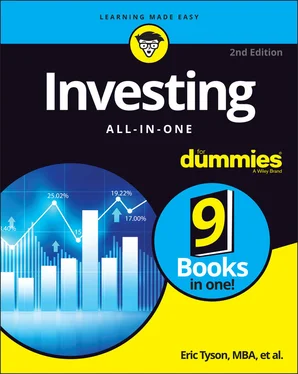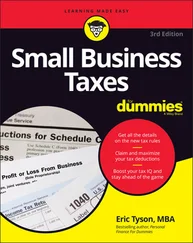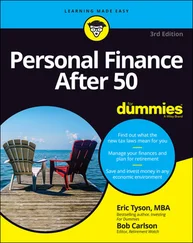Eric Tyson - Investing All-in-One For Dummies
Здесь есть возможность читать онлайн «Eric Tyson - Investing All-in-One For Dummies» — ознакомительный отрывок электронной книги совершенно бесплатно, а после прочтения отрывка купить полную версию. В некоторых случаях можно слушать аудио, скачать через торрент в формате fb2 и присутствует краткое содержание. Жанр: unrecognised, на английском языке. Описание произведения, (предисловие) а так же отзывы посетителей доступны на портале библиотеки ЛибКат.
- Название:Investing All-in-One For Dummies
- Автор:
- Жанр:
- Год:неизвестен
- ISBN:нет данных
- Рейтинг книги:3 / 5. Голосов: 1
-
Избранное:Добавить в избранное
- Отзывы:
-
Ваша оценка:
- 60
- 1
- 2
- 3
- 4
- 5
Investing All-in-One For Dummies: краткое содержание, описание и аннотация
Предлагаем к чтению аннотацию, описание, краткое содержание или предисловие (зависит от того, что написал сам автор книги «Investing All-in-One For Dummies»). Если вы не нашли необходимую информацию о книге — напишите в комментариях, мы постараемся отыскать её.
Investing All-in-One For Dummies
.
Dummies
Investing All-in-One For Dummies
Investing All-in-One For Dummies
Investing All-in-One For Dummies — читать онлайн ознакомительный отрывок
Ниже представлен текст книги, разбитый по страницам. Система сохранения места последней прочитанной страницы, позволяет с удобством читать онлайн бесплатно книгу «Investing All-in-One For Dummies», без необходимости каждый раз заново искать на чём Вы остановились. Поставьте закладку, и сможете в любой момент перейти на страницу, на которой закончили чтение.
Интервал:
Закладка:
Building a brand name: In blind taste tests, popular sodas and many well-known beers rate comparably to many generic colas and beers that are far cheaper. Yet some consumers fork over more of their hard-earned loot because of the name and packaging. Companies build brand names largely through advertising and other promotions. ( For Dummies is a brand name, but For Dummies books cost about the same as lower-quality and smaller books on similar subjects!)
Managing costs and prices: Smart companies control costs. Lowering the cost of manufacturing their products or providing their services allows companies to offer their products and services more cheaply. Managing costs may help fatten the bottom line (profit). Sometimes, though, companies try to cut too many corners, and their cost-cutting ways come back to haunt them in the form of dissatisfied customers — or even lawsuits based on a faulty or dangerous product.
Watching the competition: Successful companies usually don’t follow the herd, but they do keep an eye on what the competition is up to. If lots of competitors target one part of the market, some companies target a less-pursued segment that, if they can capture it, may produce higher profits thanks to reduced competition.
Weighing whether markets are efficient
Companies generally seek to maximize profits and maintain a healthy financial condition. Ultimately, the financial markets judge the worth of a company’s stock or bond. Trying to predict what happens to the stock and bond markets and to individual securities consumes many a market prognosticator.
In the 1960s, to the chagrin of some market soothsayers, academic scholars developed a theory called the efficient market hypothesis. This theory basically maintains the following logic: Lots of investors collect and analyze all sorts of information about companies and their securities. If investors think that a security, such as a stock, is overpriced, they sell it or don’t buy it. Conversely, if many investors believe that a security is underpriced, they buy it or hold what they already own. Because of the competition among all these investors, the price that a security trades at generally reflects what many (supposedly informed) people think it’s worth.
Therefore, the efficient market theory implies that trading in and out of securities and the overall market in an attempt to be in the right stocks at the right time is a futile endeavor. Buying or selling a security because of “new” news is also fruitless because the stock price adjusts so quickly to this news that investors can’t profit by acting on it. As Burton Malkiel so eloquently said in his classic book A Random Walk Down Wall Street, this theory, “taken to its logical extreme … means that a blindfolded monkey throwing darts at a newspaper’s financial pages could select a portfolio that would do just as well as one carefully selected by the experts.”
Some money managers have beaten the market averages. In fact, beating the market over a year or three years isn’t difficult, but few can beat the market over a decade or more. Efficient market supporters argue that some of those who beat the markets, even over a ten-year period, do so because of luck. Consider that if you flip a coin five times, on some occasions, you get five consecutive heads. This coincidence actually happens, on average, once every 32 times you do five coin-flip sequences because of random luck, not skill. Consistently identifying in advance which coin flipper will get five consecutive heads isn’t possible.
Strict believers in the efficient market hypothesis say that it’s equally impossible to identify the best money managers in advance. Some money managers, such as those who manage mutual and exchange-traded funds, possess publicly available track records. Inspecting those track records (and understanding the level of risk taken for the achieved returns) and doing other common-sense things, such as investing in funds that have lower expenses, improve your odds of performing a bit better than the market.
 Various investment markets differ in how efficient they are. Efficiency means that the current price of an investment accurately reflects its true value. Although the stock market is reasonably efficient, many consider the bond market to be even more efficient. The real estate market is less efficient because properties are unique, and sometimes less competition and access to information exist. If you can locate a seller who really needs to sell, you may be able to buy property at a sizeable discount from what it’s really worth. Small business is also less efficient. Entrepreneurs with innovative ideas and approaches can sometimes earn enormous returns.
Various investment markets differ in how efficient they are. Efficiency means that the current price of an investment accurately reflects its true value. Although the stock market is reasonably efficient, many consider the bond market to be even more efficient. The real estate market is less efficient because properties are unique, and sometimes less competition and access to information exist. If you can locate a seller who really needs to sell, you may be able to buy property at a sizeable discount from what it’s really worth. Small business is also less efficient. Entrepreneurs with innovative ideas and approaches can sometimes earn enormous returns.
Moving the market: Interest rates, inflation, and the Federal Reserve
For decades, economists, investment managers, and other (often self-anointed) gurus have attempted to understand the course of interest rates, inflation, and the monetary policies set forth by the Federal Reserve. Millions of investors follow these economic factors. Why? Because interest rates, inflation, and the Federal Reserve’s monetary policies seem to move the financial markets and the economy.
Realizing that high interest rates are generally bad
Many businesses borrow money to expand. People, who are affectionately referred to as consumers, also borrow money to finance home and auto purchases and education.
Interest rate increases tend to slow the economy. Businesses scale back on expansion plans, and some debt-laden businesses can’t afford high interest rates and go under. Most individuals possess limited budgets as well and have to scale back some purchases because of higher interest rates. For example, higher interest rates translate into higher mortgage payments for home buyers.
If high interest rates choke business expansion and consumer spending, economic growth slows or the economy shrinks — and possibly ends up in a recession. The most common definition of a recession is two consecutive quarters (six months) of contracting economic activity.
The stock market usually develops a case of the queasies as corporate profits shrink. High interest rates may depress investors’ appetites for stocks as the yields increase on certificates of deposit (CDs), Treasury bills, and other bonds.
Higher interest rates actually make some people happy. If you locked in a fixed-rate mortgage on your home or on a business loan, your loan looks much better than if you had a variable-rate mortgage. Some retirees and others who live off the interest income on their investments are happy with interest rate increases as well. Consider back in the early 1980s, for example, when a retiree received $10,000 per year in interest for each $100,000 that he invested in certificates of deposit that paid 10 percent.
Fast-forward to the early 2000s: A retiree purchasing the same CDs saw interest income slashed by about 70 percent because rates on the CDs were just 3 percent. So for every $100,000 invested, only $3,000 in interest income was paid.
If you try to live off the income that your investments produce, a 70 percent drop in that income is likely to cramp your lifestyle. So higher interest rates are better if you’re living off your investment income, right? Not necessarily.
Discovering the inflation and interest rate connection
Consider what happened to interest rates in the late 1970s and early 1980s. After the United States successfully emerged from a terrible recession in the mid-1970s, the economy seemed to be on the right track. But within just a few years, the economy was in turmoil again. The annual increase in the cost of living (known as the rate of inflation ) burst through 10 percent on its way to 14 percent. Interest rates, which are what bondholders receive when they lend their money to corporations and governments, followed inflation skyward.
Читать дальшеИнтервал:
Закладка:
Похожие книги на «Investing All-in-One For Dummies»
Представляем Вашему вниманию похожие книги на «Investing All-in-One For Dummies» списком для выбора. Мы отобрали схожую по названию и смыслу литературу в надежде предоставить читателям больше вариантов отыскать новые, интересные, ещё непрочитанные произведения.
Обсуждение, отзывы о книге «Investing All-in-One For Dummies» и просто собственные мнения читателей. Оставьте ваши комментарии, напишите, что Вы думаете о произведении, его смысле или главных героях. Укажите что конкретно понравилось, а что нет, и почему Вы так считаете.












